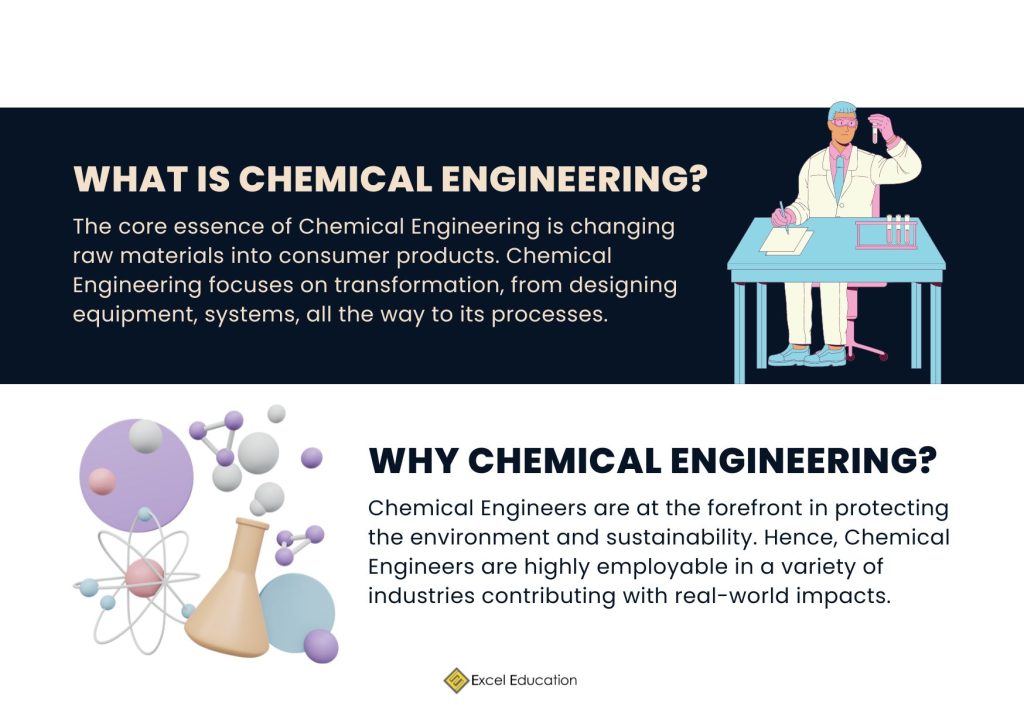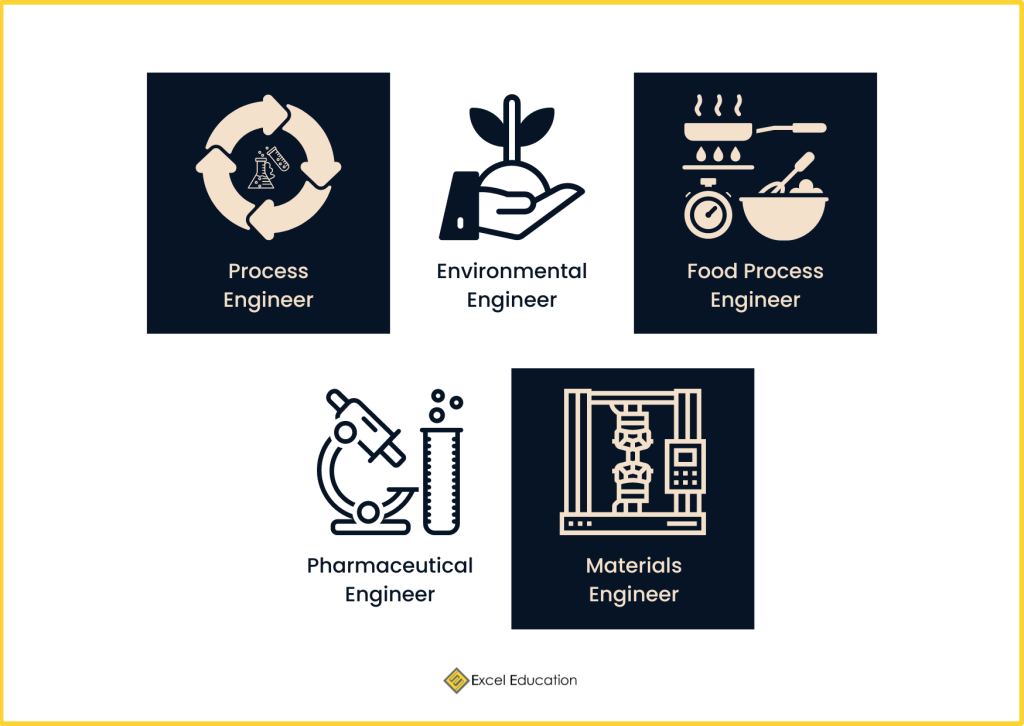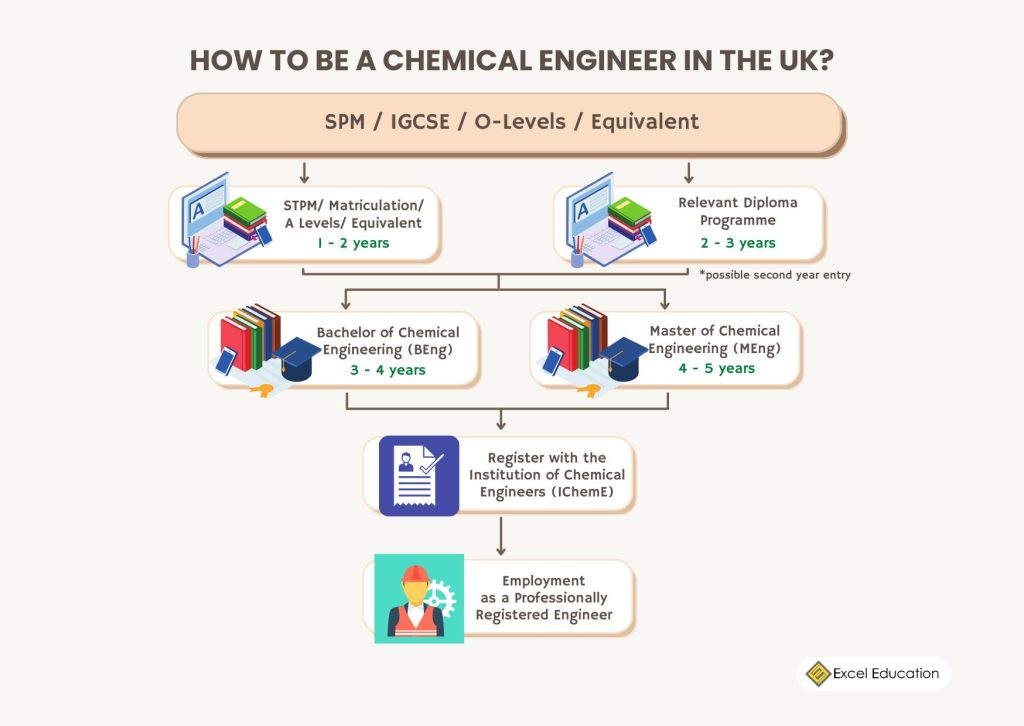
If you are looking for a practical study programme combining Chemistry, Physics, and Mathematics with chances to contribute in hands-on innovations for real-world problems, then, Chemical Engineering might be the fitting path to take! Let’s dive into the essentials of studying Chemical Engineering topped off with a list of top universities to study Chemical Engineering in the UK.
What is Chemical Engineering?

Chemical Engineering is a branch of Engineering that has to do with manufacturing and the development of products through chemical processes. The core essence of Chemical Engineering is changing raw materials into commercialised consumer products. In another way, Chemical Engineering typically centres on transformation – from designing equipment, systems, all the way to its processes.
The work of Chemical Engineers spans across many fields. Pharmaceuticals, food and beverages, energy and fuel, even shampoos and detergents, are hugely dependent on Chemical Engineers. Additionally, Chemical Engineers are at the forefront in protecting the environment and shifting to sustainability. On this account, Chemical Engineers are highly employable in a variety of industries where they can contribute with real-world impacts.
As a heads up, here are some subjects that you may encounter in a Chemical Engineering undergraduate programme: Heat Transfer, Chemical Principles, Thermodynamics, Particle Mechanics among other related subjects.
Studying Chemical Engineering is not all fun and chemical experiments, in fact, it is considered to be very challenging. Nonetheless, Chemical Engineering is widely remarked to be highly worthwhile.
Types of Chemical Engineers

Types of Chemical Engineers | Description |
Process Engineer | Process Engineers design, implement, optimise, and improve chemical and biochemical processes. Process Engineers are typically in charge of ensuring industrial scale production processes run smoothly to generate a commercial end product. |
Environmental Engineer | Environmental Engineers oversee pollution control, waste management, and climate change, where they develop solutions to environmental problems. General tasks for Environmental Engineers can include remediating contaminated sites, designing renewable energy systems, and monitoring pollutants or hazardous materials. |
Food Process Engineer | Food Process Engineers design food processing systems extending to any equipment used in handling or packaging food products. Food Process Engineers can work in varying industries, including packaging firms and agricultural agencies. |
Pharmaceutical Engineer | Pharmaceutical Engineers research, develop, test, pharmaceutical products as well as its manufacturing processes. Pharmaceutical Engineers generally collaborate with other professionals ensuring their works are compliant with regulatory safety guidelines. |
Materials Engineer | Materials Engineers study, develop, and test materials, where they find innovative ways to use these materials. Materials Engineers mainly focus on the aspects of production including costs, production process, and production quality. |
Skills Required to Study Chemical Engineering

- Mathematical Acumen
Mathematics is integral to Chemical Engineering, making mathematical acumen or proficiency necessary to study Chemical Engineering. In Chemical Engineering programmes, subjects such as advanced mathematics, calculus, and linear algebra is something to be expected.
- Unit Operation
Unit operation is a basic step in a process which involves physical change or chemical transformation such as evaporation, separation, and other reactions. For example, in milk processing, the following unit operations are involved: homogenization, pasteurisation, and packaging. Familiarity in fundamental unit operations would greatly benefit those in Chemical Engineering.
- Fluid Dynamics
Fluid dynamics allow for efficient and optimised design of chemical processes, which is a major core element of Chemical Engineering. Students should fully grasp fluid dynamics to understand heat transfers, flow rates, and pressure drops, and overall fluid behaviours for efficient Chemical operations and equipment designs.
- Knowledge of Engineering Software
Knowledge of Engineering softwares such as AutoCAD and MatLab is necessary for process simulation, design, analysis, and optimization in Chemical Engineering projects. Having competence in utilising Engineering softwares is an indispensable skill both in the academic and professional field of Chemical Engineering.
- Mastery of Chemistry Principles
Chemical Engineering is all about chemical reactions and elements, factors, and the optimization of those components. To breeze through your Chemical Engineering, understanding the principles of Chemistry is favourable.
Career Options for Chemical Engineer Graduates
Listed below are some career options for Chemical Engineering graduates to venture into:
- Chemical Engineer
- Energy Engineer
- Petroleum Engineer
- Product/Process Development Scientist
- Mining Engineer
- Technical Plant Manager
- Applications Engineer
- Wellsite Drilling Engineer
- Wind Analyst
- Graduate Operations Support Engineer
The reported average annual salary for a Chemical Engineer in the UK ranges from £30,000 to £65,000.
How to be a Chemical Engineer in the UK?

In order to professionally practise as an Chemical Engineer in the UK, here are some steps to take:
Step 1: After SPM or equivalent examinations, complete a pre-university programme which grants you entry into Chemical Engineering programmes in the UK. Typically for a Chemical Engineering programme, you’d need Mathematics, a Physical Science subject, and English.
Once you have finished SPM and decide to enrol into a Diploma programme taking up to 2-3 years, you may gain entry into the second year of a Chemical Engineering undergraduate degree. This is significantly dependent on the university that you are enrolled in and the grades you have upon completion.
Step 2: Enrol into an accredited Chemical Engineering degree. Accreditations should be from the Institution of Chemical Engineers (IChemE). You could consider enrolling into either a Bachelor of Engineering (BEng) or a Master of Engineering (MEng) for Chemical Engineering.
Difference between these two is that:
- MEng is an undergraduate course with an integrated Master’s.
- BEng has a duration of 3 years (4 years with placement) while MEng has a duration of 4 years (5 years with placement).
- BEng graduates can become Incorporated Engineers (IEng), however MEng graduates go on to become Chartered Engineers (CEng) because becoming a chartered engineer requires four years of study. BEng graduates would have to complete a Master’s if they want to practise with the CEng title.
Additionally, in this stage, you should build your portfolio and boost professional developments as it would benefit when applying for full-time careers upon graduation. If you wish to become a Chartered Chemical Engineering with the CEng title, you should enrol in a postgraduate Chemical Engineering programme.
Step 3: Register and meet required criterias standardised by the Institution of Chemical Engineers (IChemE).
Step 4: Join employment as a professionally registered Chemical Engineer with an appropriate title.
General Entry Requirements to Study Chemical Engineering
Academic Entry
Subject prerequisites for Chemical Engineering are a Mathematics subject and a Physical Science subject: Chemistry, Physics, or Biology.
Academic Entry | Minimum Score |
A-Levels | BBC (including Mathematics & Physics/Design & Technology/Engineering/Chemistry) |
IB Diploma | 32 (including Mathematics & Physics) |
UEC | B4 in 5 Subjects (with Mathematics & Chemistry) |
STPM | CGPA 3.00 (at least B in Mathematics & Physics) |
Matriculation | CGPA 3.10 (with Mathematics & Chemistry) |
Australian Matriculation (ATAR) | 90 (with Mathematics & Chemistry) |
Canadian Pre-University (CPU) | 65% in 6 Courses (with Mathematics & Chemistry) |
Note: Universities may have different requirements. To learn more, get in touch with us!
English Language Entry Requirements
Entry Level | Minimum Score |
IELTS | 6.0 |
TOEFL | 78 |
Pearson Test of English (PTE) | 59 |
SPM 1119 | C |
Note: Universities may have different requirements. To learn more, get in touch with us!
Top Universities to study Chemical Engineering in the UK
1. University of Sheffield

The University of Sheffield is a public research university located in Sheffield, England with history dating all the way back to the year 1828. Sheffield is a founding member of the prestigious Russell Group and in 2024, Sheffield is ranked in the top 20 among universities in the UK, marking its reputation as an esteemed academic institution.
Additionally, the University of Sheffield ranks 11th among universities in the UK for the Chemical Engineering subject in 2024. The Chemical Engineering BEng programme offered by the University of Sheffield offers accredited and comprehensive curriculums alongside industrial-scale facilities and optional placement year or study abroad opportunities to boost employability.
Programme Offered | Chemical Engineering BEng |
Duration | 3 or 4 Years |
Intake | September |
Annual Indicative Fees (2024) | International Students: £29,110 |
Disclaimer: An additional year of study duration includes an industrial/professional placement or a year of study abroad.
Contact us right now for a free consultation if you’d like more details about the costs, the format of the programme, and the entry requirements!
2. Lancaster University

Lancaster University is a notable public tertiary education learning institution established in 1964. In 2024, Lancaster University proves its academic excellence through their rank in the 20th spot among all universities in the UK.
Prospective students in the Chemical Engineering BEng Hons programme by Lancaster University can expect a hands-on approach to learning conducted by world-class academics with a chance to solve an open-ended design project in your final year. Also, the programme has professional accreditations with opportunities for year in industry or year abroad programmes.
Programme Offered | Chemical Engineering BEng Hons |
Duration | 3 or 4 Years |
Intake | September |
Annual Indicative Fees (2024) | International Students: £28,675 |
Disclaimer: An additional year of study duration includes an industrial/professional placement or a year of study abroad.
Contact us right now for a free consultation if you’d like more details about the costs, the format of the programme, and the entry requirements!
3. University of Birmingham

The University of Birmingham, founded in 1825, is a public research university operating in Birmingham, England. The University of Birmingham is a reputable study destination proven through their ranks in the top 15 among universities in the UK and in the top 100 among universities globally.
What’s more, in 2024, the University of Birmingham is in the top 10 among universities in the UK for the Chemical Engineering subject, fitting for those wondering where to study Chemical Engineering in the UK. Birmingham’s Chemical Engineering BEng programme offers prospective students with an accredited curriculum, alongside engaging learning experiences, opportunities to work on innovative projects as well as international study opportunities.
Programme Offered | Chemical Engineering BEng |
Duration | 3 or 4 Years |
Intake | September |
Annual Indicative Fees (2024) | International Students: £28,560 |
Disclaimer: An additional year of study duration includes an industrial/professional placement or a year of study abroad.
Contact us right now for a free consultation if you’d like more details about the costs, the format of the programme, and the entry requirements!
4. University of Aberdeen

The University of Aberdeen is a public research university located in Aberdeen, Scotland, with history traced as far back as 1495, granting their reputation as one of the ancient universities in the UK. Aberdeen has notable alumni, specifically five Nobel laureates with two of them in Chemistry.
For the Chemical Engineering subject in 2024, the University of Aberdeen was ranked in the top 25 among universities in the UK, making it a suitable study destination for those wanting to academically pursue Chemical Engineering in the UK. The Chemical Engineering BEng programme at Aberdeen is accredited and prospective students have access to join international competitions and student societies.
Programme Offered | Chemical Engineering, BEng |
Duration | 4 Years |
Intake | September |
Annual Indicative Fees (2024) | International Students: £24,800 |
Disclaimer: The Chemical Engineering BEng programme at the University of Aberdeen does not offer industrial placement.
Contact us right now for a free consultation if you’d like more details about the costs, the format of the programme, and the entry requirements!
5. Swansea University

Swansea University, chartered in 1920, is a public higher education learning institution based in Swansea, Wales, United Kingdom. Amongst universities in the UK, Swansea was ranked in the top 40 for the year of 2024.
For a comparatively affordable Chemical Engineering study programme in the UK, Swansea is the answer you’re looking for. Swansea University was placed in the top 20 for the Chemical Engineering subject among universities in the UK for the year 2024, offering a professionally accredited programme equipped with opportunities for global study abroad programmes as well as opportunities for industrial placements.
Programme Offered | Chemical Engineering, BEng (Hons) |
Duration | 3 or 4 Years |
Intake | September |
Annual Indicative Fees (2024) | International Students: £23,500 |
Disclaimer: An additional year of study duration includes an industrial/professional placement or a year of study abroad.
Contact us right now for a free consultation if you’d like more details about the costs, the format of the programme, and the entry requirements!
For more information regarding the university, programme offered, entry requirements and fees, contact Excel Education.
Contact us to find out more!
Student enquiries:
Call/ WhatsApp: +60162206607
Email: [email protected]
About The Author

Hannah Hir
Hannah appreciates various art forms, especially Asian literature, film and music. Most of her favorite Malaysian kuihs are green-coloured.

